Letter from Laura Windust to Esther Windust

Laura Windust writes Esther Windust and tells her about Isabel in Rome as well as plans for going to Sweden in July.


Laura Windust writes Esther Windust and tells her about Isabel in Rome as well as plans for going to Sweden in July.

Secretary of War William Wilkins (Class of 1802) responds William Biddle's questions about bids for harbor improvements in Erie, Pennsylvania.
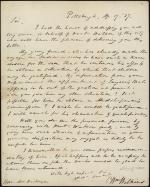
Former US Senator William Wilkins (Class of 1802) writes Secretary of the Navy Mahlon Dickerson and asks for Doctor Watson to be appointed as a Surgeon’s Mate or receive Midshipman’s commission.
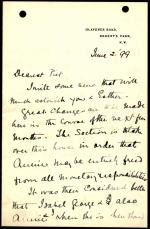
Laura Windust informs Piet that the section will be taking over the house in order to free Annie Besant entirely from monetary responsibilities.
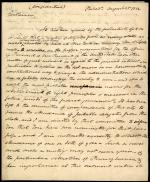
John Bradford Wallace writes to Robert Coleman and James Hopkins, who have been nominated to a secret meeting of Federalists in New York.

Chemist and 1979 Priestley Award recipient Melvin Calvin responds to an inquiry from Barry Fortson, explaining that the "most exciting moment in my life in chemistry" was "clos[ing] the carbon cycle one day in my head."

Writer and poet Stephan Vincent Benét writes to his mother, Frances. He discusses a recent speaking engagement at Saybrook College, the cold weather, and his daughter Rachel's pet canary. Envelope included.
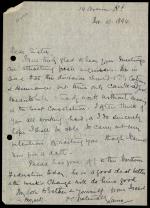
Laura Windust writes to her sister, Esther Windust, about George Mead's departure to the Northern Federation. Laura also comments on the division and notes that only time will heal it.
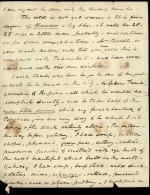
William Wilkins, United States Minister to Russia, writes to his daughter Maria from abroad. Wilkins tells her about a dinner with the British Minister and wishes that Maria's brother Charles could go to school in St.
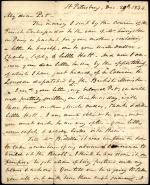
Minister to Russia William Wilkins writes to his daughter, whom he calls "Pet." Wilkins says that he received her letter and describes packages he sent with Mr. Livingstone. He also says that Mr.
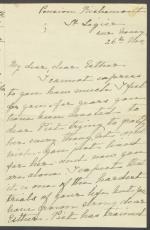
Countess Constance Wachtmeister offers condolence to Mrs. Esther Windust after Piet's death.
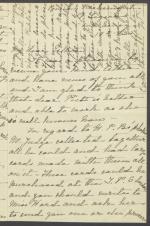
Countess Constance Wachtmeister writes Mrs. Esther Windust and discuses photos of Helena Petrovna Blavatsky and describes a successful speaking engagement in Edinburgh.
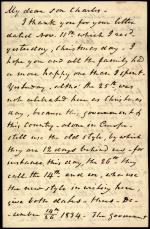
Diplomat and politician William Wilkins (Class of 1802) writes his son, Charles, and explains the Russian calendar. Wilkins also urges his son to resist temptation.
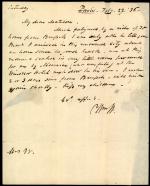
William Wilkins writes to his wife, Matilda Wilkins, expressing fatigue from a journey to Brussels. Transcript included.
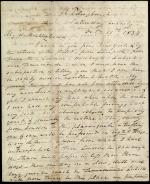
William Wilkins writes to his wife, Matilda Wilkins, and discusses a recent voyage from London to Tansmundi. William also gives his regards to their children. Transcript included.
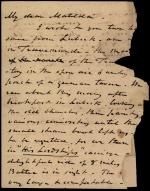
William Wilkins writes to his wife, Matilda Wilkins, during a trip from Transmundi to St. Petersburg. He discusses sightseeing in Lubeck and an eight-mile ride in "His Lordship's" carriage.
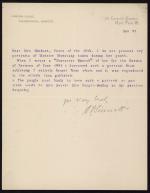
Alfred Sinnett responds to Mrs. Esther Windust's question regarding a portrait of Madame Blavatsky.
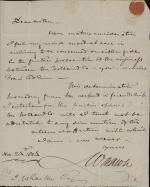
Attorney William Rawle writes to Isaac Wharton and explains his decision to not take sides in the prosecution of the Holland Company.
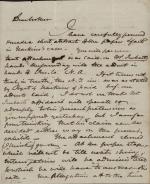
Attorney William Rawle writes to Isaac Wharton and discusses a legal case. "His claim can be decided either way on the present exhibits," as Rawle explains.

United States House of Representatives Minority Leader Gerald Ford writes to Paul R. Walker (Class of 1921), a longtime contributing editor and columnist for the Harrisburg Patriot-News.

William Rose Benét writes to his sister, Laura Benét, with a clipping about the family from the Cape Ann Summer Sun.
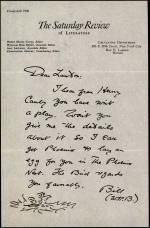
Two letters from William Rose Benét to Lawton Mackall: the first asking for details about a play Mackall has written; the second explaining that he has no room to publish a piece by one of Mackall's friends.

W. P. Maclay writes to his aunt, Isabella Bell, regarding the recent death of his father.
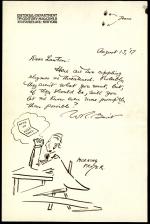
William Rose Benét writes two letters to Lawton Mackall: the first promises poems and includes a drawing; the second explains Benét's plans to travel for ten days.

S. J. Mills, who works in the Osage Agency of the United States Indian Service, writes to Dr. Cornelius R. Agnew about the return of a blind Indian and provides an update on the progress of new facilities for Native Americans.